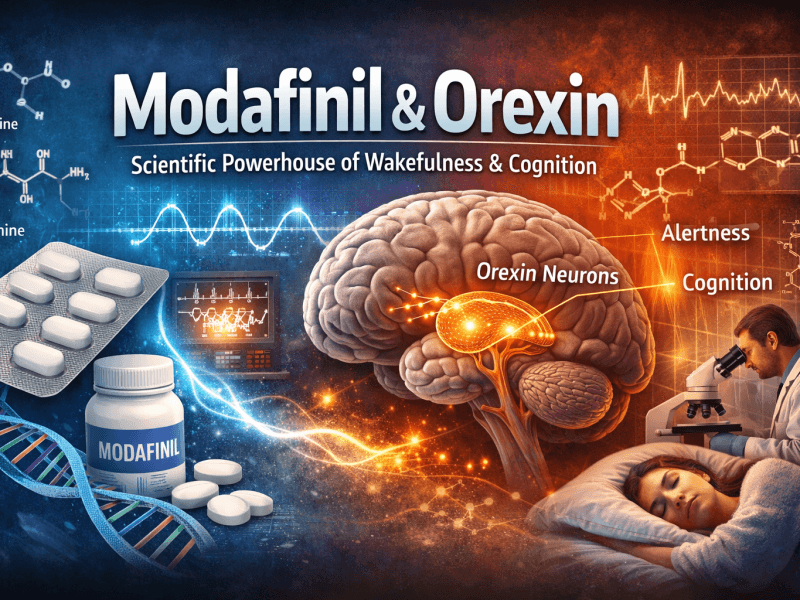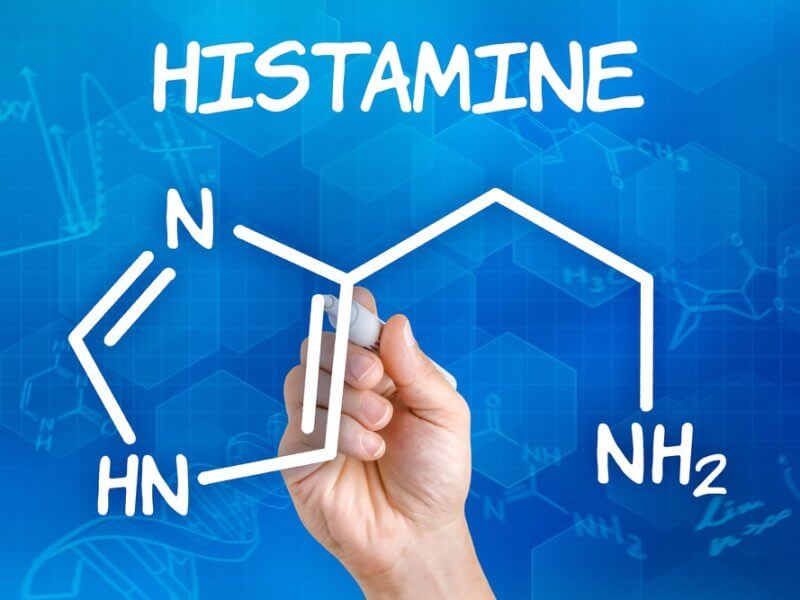Last Updated on 17/02/2025 by James Anderson
Modafinil Mechanism of Action
Modafinil is a wakefulness-promoting agent primarily prescribed for conditions such as narcolepsy, shift work sleep disorder, and obstructive sleep apnea. Its mechanism of action is unique and multifaceted, involving the modulation of neurotransmitter systems. Unlike traditional stimulants, modafinil exerts its effects without directly targeting dopamine receptors.
Modafinil enhances dopamine signaling by inhibiting the dopamine transporter (DAT), thereby increasing extracellular dopamine levels. This action improves cognitive functions such as attention, memory retention, and task motivation. Additionally, it affects other neurotransmitter systems, including norepinephrine, serotonin, histamine, and gamma aminobutyric acid (GABA), contributing to its cognitive-enhancing properties. This combination makes modafinil a promising candidate for improving memory and learning.
Effects on Memory and Learning in Clinical Studies
Numerous clinical studies have investigated modafinil impact on memory consolidation and learning processes. Research consistently highlights its ability to enhance working memory, improve executive function, and promote decision-making skills.
A study published in Neuropsychopharmacology examined the effects of modafinil on healthy adults. Participants demonstrated significant improvements in complex problem solving tasks, enhanced verbal memory, and sustained attention compared to a placebo group. These findings indicate modafinil’s potential to bolster cognitive performance, particularly under conditions of fatigue or sleep deprivation.
Furthermore, patients with cognitive impairments, such as those resulting from neurological disorders or psychiatric conditions, have reported marked improvements in memory recall and information retention. Such results emphasize modafinil’s therapeutic applications beyond its approved indications.
Experimental Studies on Modafinil
Experimental studies conducted on both animal models and human subjects reveal additional insights into modafinil effects on memory and learning. Rodent studies, for instance, show improved spatial learning and memory retention when modafinil is administered prior to cognitive tasks. These findings are attributed to increased hippocampal activity, a brain region crucial for memory formation.
In humans, functional magnetic resonance imaging (fMRI) studies have demonstrated that modafinil enhances connectivity in brain networks responsible for attention and learning. Modafinil ability to facilitate neural plasticity further underlines its potential in cognitive enhancement.
Notably, modafinil is often referred to as a “eugeroic” drug rather than a stimulant, highlighting its distinct mechanism of promoting wakefulness without inducing hyperactivity. This quality makes it particularly valuable in experimental settings where sustained attention is required for complex cognitive tasks.
Potential Therapeutic Applications
The therapeutic potential of modafinil extends beyond its conventional uses. Research suggests its applicability in treating neurodegenerative diseases such as Alzheimer’s and Parkinson’s, where cognitive decline is a predominant symptom. Modafinil ability to enhance synaptic plasticity and support memory retention could offer new treatment avenues for these conditions.
Additionally, modafinil has been explored as an adjunct therapy for psychiatric disorders such as depression and schizophrenia, both of which are often accompanied by cognitive deficits. By improving working memory and decision making capabilities, modafinil addresses these impairments, thereby enhancing overall quality of life for affected individuals.
In educational and professional environments, modafinil has garnered attention as a “smart drug” for its potential to improve focus, task efficiency, and learning outcomes. However, ethical concerns and regulatory restrictions limit its widespread use in this context.
Safety and Ethical Considerations
While modafinil is generally well tolerated, its use raises important safety and ethical considerations. Common side effects include headaches, nausea, and insomnia, although these are typically mild and transient. Rare but severe side effects, such as hypersensitivity reactions or psychiatric symptoms, warrant caution.
From an ethical perspective, the off-label use of modafinil as a cognitive enhancer in healthy individuals has sparked debate. Critics argue that it may create unfair advantages in competitive environments, while proponents emphasize its potential to unlock human potential in a controlled manner.
Long-term safety data on modafinil use remain limited. Therefore, careful monitoring and adherence to medical guidelines are essential when considering its application for memory and learning enhancement.
Conclusion
Modafinil influence on memory and learning represents a fascinating area of research with promising implications for clinical and non clinical settings. Its ability to improve cognitive functions, particularly under challenging conditions, highlights its value as a cognitive enhancer. However, ethical and safety concerns must be carefully navigated to ensure its responsible use.
As ongoing studies continue to uncover modafinil full potential, it remains a valuable tool for addressing cognitive impairments and promoting enhanced learning outcomes.
‼️ Disclaimer: The information provided in this article about modafinil is intended for informational purposes only and is not a substitute for professional medical consultation or recommendations. The author of the article are not responsible for any errors, omissions, or actions based on the information provided.
References:
- D. Béracochéa. Improvement of learning processes following chronic systemic administration of modafinil in mice. Pharmacol. Biochem. Behav. Anderson AL, Li SH, Biswas K, McSherry F, Holmes T, Iturriaga E, Kahn R, Chiang N, Beresford T, Campbell J, Haning W, Mawhinney J, McCann M, Rawson R, Stock C, Weis D, Yu E, Elkashef AM. Modafinil for the treatment of methamphetamine dependence. Drug Alcohol Depend. 2012
- Afifi AK. The basal ganglia: a neural network with more than motor function. Semin Pediatr Neurol. 2003
- O. Flores. beta-Adrenoceptor blockade depresses molecular and functional plasticities in the rat neocortex. Brain Res. Bull. 2010.
- Anderson AL, Reid MS, Li SH, Holmes T, Shemanski L, Slee A, Smith EV, Kahn R, Chiang N, Vocci F, Ciraulo D, Dackis C, Roache JD, Salloum IM, Somoza E, Urschel HC, 3rd, Elkashef AM. Modafinil for the treatment of cocaine dependence. Drug Alcohol Depend. 2009
- Aston Jones G, Cohen JD. An integrative theory of locus coeruleus-norepinephrine function: adaptive gain and optimal performance. Annu Rev Neurosci. 2005
- Beck P, Odle A, Wallace Huitt T, Skinner RD, Garcia-Rill E. Modafinil increases arousal determined by P13 potential amplitude: an effect blocked by gap junction antagonists. Sleep. 2008
- Bentley P, Driver J, Dolan RJ. Cholinergic modulation of cognition: insights from human pharmacological functional neuroimaging. Prog Neurobiol. 2011
- Boutrel B, Steiner N, Halfon O. The hypocretins and the reward function: what have we learned so far? Front Behav Neurosci. 2013
- Brasil Neto JP. Learning, memory, and transcranial direct current stimulation. Front Psychiatry. 2012


